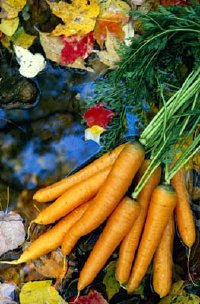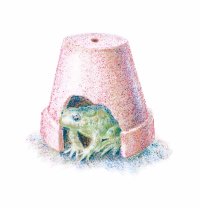Organic gardening is popular today, and for good reason: It works wonderfully! Organic gardeners shun the use of synthetic chemicals to keep their yards free from potential hazards. But the real success of organic gardens lies in the methods used to keep plants growing vigorously, without a heavy reliance on sprays. Organic gardening cuts right to the heart of the matter: soil.
 Get air into your compost pile by putting a PVC pipe down the middle of it. See more pictures of garden ideas. |
Soil is the life force of the garden. When enriched with organic matter, the soil becomes moist, fertile, and airy -- ideal for healthy plants. It also nourishes a rich population of beneficial organisms such as earthworms and nutrient-releasing bacteria. And it harbors root-extending fungi that help make growing conditions optimal.
Organic gardeners also stress problem prevention in the garden. Putting plants in the right amount of sun, along with suitable soil, proper spacing, and ideal planting and watering, allows most plants to thrive with minimal upsets.
|
Learn More
|
The tips in this article will give you the basics on organic gardening. We'll start with how to make compost.
- Make compost the lazy way by layering leaves, lawn clippings, and kitchen waste. Then simply leave it until it's ready. Nature's recyclers will take organic matter no matter how it is presented and turn it into rich, dark compost. This process just takes longer in an untended pile.
To begin your compost heap, dump yard scraps in a far corner of the yard. An ideal blend would be equal amounts of soft or green material (manure and fresh leaves) and brown or hard material (dead leaves and chopped twigs). Or, if you prefer, keep the compost materials neatly contained in a wooden slat or wire mesh bin. If you put an access door on the bottom of the bin, you can scoop out the finished compost at the bottom while the rest is still decaying. - Add compost starter or good garden soil to a new compost pile to help jump-start the decay of organic materials.
Compost starter, available in garden centers or from mail-order garden catalogues, contains decay-causing microorganisms. Some brands also contain nutrients, enzymes, hormones, and other stimulants that help decomposers work as fast as possible. Special formulations can be particularly helpful for hard-to-compost, woody material like wood chips and sawdust or for quick decay of brown leaves.Optional Compost-Making Equipment These items will come in handy when starting your own compost:
- Wire composting bin
- Stackable composting bin
- Wooden composting bin
- Vented plastic bins
- Worm boxes
- Compost tumbler
- Compost inoculant
- Garden fork
- Compost thermometer
- Sifting screen
- Good garden or woodland soil, although not as high-tech or as expensive as compost starter, contains native decomposers well able to tackle a compost pile. Sprinkle it among the yard scraps as you are building the pile.
- Use perforated PVC pipes to aerate compost piles. An ideal compost pile will reach three to four feet high, big enough to get warm from the heat of decay. Why is heat important? High temperatures -- when a pile is warm enough to steam on a cool morning -- semi-sterilize the developing compost, killing disease spores, hibernating pests, and weed seeds.But the problem is that in order for decomposers to work efficiently enough to create heat, they need plenty of air -- and not just at the surface of the pile. Aeration is traditionally provided by fluffing or turning the pile with a pitchfork, which can be hard work. But with a little advance planning and a perforated pipe, this can be avoided.
- Start a compost pile on a bed of branched sticks that will allow air to rise from below. Add a perforated pipe in the center, building layers of old leaves, grass clippings, and other garden leftovers around it. The air will flow through the pipe into the pile.
- Use on-site composting for easy soil improvement. Gather up old leaves, livestock manure, and/or green vegetable scraps and let them lie in or beside the garden until they rot, then work them into the soil. Or just heap them on the garden in the fall and till them into the soil. They will be decayed by spring. You can also dig a hole, dump in the yard waste, cover it with a little soil, and let it rot in privacy.
Check out the next section for suggestions on using organic fertilizer in your garden.
Want more gardening tips? Try:
- Gardening Tips: Learn great helpful hints for all of your gardening needs.
- Annuals: Plant these beauties in your garden.
- Perennials: Choose great plants that will return year after year.
- Gardening: Discover how to garden.
Advertisement

